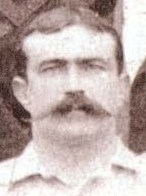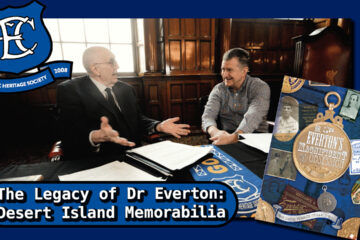By being the first man to captain both Everton Football Club and their local rivals Liverpool, Andrew Hannah holds a unique position in Merseyside folklore.
He was born of Irish parentage on 17 September 1864, at Renton, Dunbartonshire where his father, Henry, was running a grocery shop. The premises stood at 72 Main Street where he was assisted by his wife, Margaret. The couple had one other son.
Hannah started his football career playing at full back with the Renton club and was in the side that beat Vale of Leven, by 3 goals to 1, in the 1885 Scottish FA Cup Final. He was also in the Renton side when they lifted the trophy for a second time in 1888 with a 6-1 win over Cambuslang. On 3 March that year, he won his only international cap when he represented Scotland in a 5-1 win over Wales at Easter Road in Edinburgh.
On 27 April 1888, Andrew Hannah married Jessie Thompson at Fulshaw Cottage, Renton. He was still living on Main Street and listed his occupation as being a dairyman. The next month, he took part in an exhibition match for a Pewter Trophy against the FA Cup holders West Bromwich Albion at Hampden Park and beat them by 4 goals to 1. Hannah later signed for the West Midlands club but failed to settle and quickly returned home.
On 23 March 1889, he arrived in Liverpool with the Renton team for a game against Everton that drew a crowd of over 12,000 spectators to Anfield. The visitors took the lead but the home side, with goals from Briscoe and Millward, hit back to win 2-1. Andrew Hannah then signed for Everton and was appointed to the role of club captain. He took part in all of the games that were required to complete his first Football League season as Everton finished in second place.
The next season, the Scotsman missed just two Football League matches as he captained Everton to the Football League championship. Hannah had taken part in 42 league and FA Cup games for the club. Meanwhile, back home in Renton, Jessie had given birth to 2 daughters who had been baptised with the names of Janet and Margaret.
The 1891 census, taken in on 5 April, records Andrew Hannah living on Oakfield Road. The exact location of his home is a little mysterious because it does not appear to have a number on the front door. He was sharing the residence with Alex McGregor who listed his occupation as a Professional Footballer. Hannah however, claimed to be both a professional footballer and a dairyman. McGregor had joined Everton in the summer of 1890 from the Vale of Leven club but was never to feature in the first eleven. When their contracts with the club ended, both men returned to their homes in Scotland.
Hannah spent one more season playing with Renton and was then persuaded to join the newly formed Liverpool Football Club. He captained them to both the Lancashire League and Football League Division 2 championships but tasted the bitterness of relegation before he returned to Scotland where he signed for Clyde.
The 1901 census tells us Andrew was the licensee of the Black Bull Hotel which stands at 11 East High Street in Kirkintilloch. The form reveals that Jessie had “passed away” and that Andrew was married to Mary McQuaker with whom he had fathered another 4 children. He had also, on the odd occasion, played football for the local Rob Roy FC.
The 1911 census finds the family living at 9 North Elgin Street, Clydebank where the head of the household was working in the local shipyard. On 5 August 1934, his name appears on the passenger list of the SS Caledonia, which belonged to the Anchor Line, when it arrived in Glasgow from New York. He had retired and was living at the same address. (He had almost certainly been to comfort his two grandchildren following the recent death of his daughter Janet in Canada.)
Andrew Hannah was still living at 7 North Elgin Street when he died, on 17 June 1940, at the Western Infirmary in Glasgow. He was buried in an unmarked grave at Kilbowie Cemetery in the town of Clydebank.




